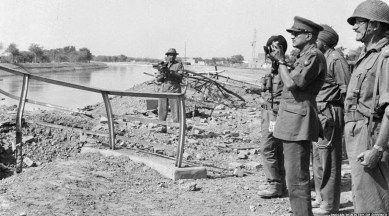Stay updated with the latest - Click here to follow us on Instagram
Military Digest: 1965 Indo-Pak war and US concerns over Chinese intervention in conflict
With India China having fought a war just three years ago in 1962, the US was concerned that with growing cosiness of Pakistan with China, the latter may spring to Pakistan’s aid by threatening India.

It is that time of the year when we remember the Pakistani aggression in Jammu and Kashmir in Operation Gibraltar and the Indian riposte in Punjab in 1965. The Indian response in September 1965 by opening fronts in Punjab caught Pakistan Army by surprise as they had been expecting that India will restrict its response to the state of Jammu and Kashmir where the Pakistani Army had launched a conventional offensive along with large groups of infiltrators.
Research in US archives shows that the Americans were very worried about any Chinese intervention in the conflict on the side of Pakistan. With India China having fought a war just three years ago in 1962, the US was concerned that with growing cosiness of Pakistan with China, the latter may spring to Pakistan’s aid by threatening India.
Recorded phone conversations between President Lyndon B Johnson and Secretary of State Robert Mc Namara reveal discussions taking place on these lines. Mc Namara says in a taped conversation, dated September 8, 1965, that a number of contingencies could arise from the ongoing India-Pakistan conflict including Chinese intervention and that the US should be prepared to deal with it.
Johnson agrees with Mc Namara on this count and talks about the possibility of a Russian response to the crises before the conversation ends.
Lyndon Johnson had a bias in favour of Pakistan and this stemmed from his previous experience as Vice President when he had visited Pakistan in 1961. However, he was perturbed at the growing Chinese influence on Pakistan and had expressed his concern in 1963 to the then Pakistan foreign minister Zulfiqar Ali Bhutto.
The slant of President Johnson towards Pakistan in the run up to the 1965 conflict was very pronounced. The US archives include an interview of Robert Komer then a Deputy Secretary of State, who quotes Johnson as saying to him, “You know, I like Ayub (Field Marshal Mohammed Ayub Khan]. Ayub is a very good guy, and those Indians are the worst people to deal with I’ve ever seen in my life”. Komer explained that the Muslims of Pakistan were quite similar to westerners in their way of thinking while the Indian-Hindu philosophy was quite antithetical to the western philosophy. However he cautioned that “You don’t make foreign policy on the basis of who you like and who you don’t like. Pakistan has a hundred million people, India has over five hundred million people and If we’re going to try and do something with South Asia as a counterweight to China, we better look at India as first priority and not at Pakistan which is one-fifth the size”.
Komer further said that US had built its policy on the assumption that the Pakistanis were going to support US against the Russians and the Chinese.
“We have now found seven years later that the Paks are interested in one thing-India and Kashmir, that the whole Pakistani policy Is centered around trying to find friends and big brothers as countervedge to India. Well, we have no interest in helping Pakistan against India, and we have a hell of a strategic interest in building up India against China as a counterweight,” he said.
It is a fact that China adopted threatening posture towards India during the 1965 war. With the Indians advancing towards Lahore and Sialkot, President Ayub Khan of Pakistan got worried and was approaching US and China for intervention in getting the conflict to stop. US archives state, “During the period from September 10 to September 22, the Indians became increasingly concerned about the possibility of Chinese action to help Pakistan. There were numerous reports of military activity along the border areas”.
The records further state that on September 16, Communist China presented a virtual ultimatum threatening “grave consequences” to India and protesting “Indian incursions” Into Chinese territory in the northeast of India. The United States was anxious that Pakistan not call on the Chinese in desperation; thus there were renewed US efforts to stop the conflict and to have the UN pass a resolution to bring the fighting to an end and to deal with the underlying problems including Kashmir. The US records say that the key ingredients involved in finally halting the 1965 Indo-Pak conflict concerned the great powers. “The Chinese threat of military action obviously tempered any Indian thoughts of continuing action,” say the US Presidential archives of President Johnson.